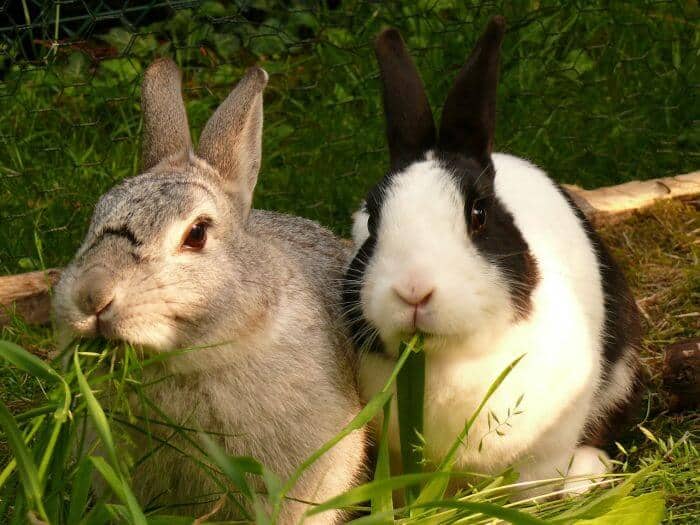Raising rabbits is something I’ve wanted to do for quite some time, but I’m not quite ready to take the leap.
It’s not because I’m worried about the challenges of feeding them. In fact, rabbits are some of the easiest critters you can care for!

As herbivores, they can eat just about any kind of plant, but you might be wondering, “can rabbits eat eggplant?”
You may be worried about feeding your rabbits eggplant because you heard that they can’t handle plants from the nightshade family – and to some extent, that’s true. But there is one part of the plant you can feed them…
Yes, rabbits can eat eggplant – but be careful not to feed any part of the plant itself! Don’t feed them leaves, stems, or roots. However, they can eat the vegetable itself as an occasional treat.
They’re just like us in that the leaves, stems, and other parts of nightshade plants (including tomatoes and peppers along with eggplant) are toxic. So, while you can feed your rabbits eggplant, there are some considerations you’ll want to keep in mind.
This is because eggplant is part of the nightshade family, Solanaceae. Along with peppers, tomatoes, and potatoes, eggplant can be highly toxic. Avoid feeding the peels, too!
Eggplant, or Solanum melongena, is a perennial plant (yes, perennial! but only in some places) that is usually grown specifically for its spongy white, green, or purple fruits.
It is often used for culinary purposes, although the plant is quite gorgeous to look at, too. It produces lovely purple or blue flowers atop a spiny stem.
However, all plants in the Solanaceae family contain a toxic glycoalkaloid, known as solanine. Glycoalkaloids are bitter-tasting organic compounds that can be extremely toxic. Solanine acts as a natural pesticide, as many plants develop this chemical to deter insects.
It’s important to note that other members of this family, like potatoes, contain more solanine than eggplant. In fact, potatoes have the highest amount, most of which is concentrated in their eyes or in their green sections.
Solanine poisoning can affect all species, with symptoms including diarrhea, vomiting, abdominal pain, slow pulse, low respiration rate, headache, and fever.
These symptoms can be suffered by just about any animal after consuming solanine – yourself included!
Diarrhea in rabbits is particularly dangerous. It can be fatal, in fact.
In most cases, it’s totally fine to give your rabbits eggplant as long as you are only feeding the fruit.
They cannot eat parts of the plant, as these are those that contain solanine. They should be given only as an occasional treat, just as you would feed other fruits and non-leafy vegetables to your rabbits.
When in doubt, cook your eggplant. Nightshade poisoning, which comes from elevated levels of the chemical solanine in the plants, is rare when you’re only feeding the actual eggplant fruit itself, but cooking can completely eliminate the risk.
However, do keep in mind that cooking eggplant can slightly reduce its nutritional value.
Also, mind the quantity. Eggplant is high in starch so you’ll want to feed it in small amounts to avoid overloading your rabbit’s delicate digestive system – something I’ll tell you more about later in this article.
Nutritional Profile of Eggplant
Eggplant is a food rich in nutrients, vitamins, and minerals. It contains a lot of manganese, as well as smaller amounts of C, B5, B6, E, K and folate vitamins. You’ll also find a good amount of calcium, iron, phosphorous, and potassium.
Additionally, eggplants are fairly low in calories and fat but contain high levels of antioxidants. Eggplant is also very hydrating since it’s primarily made up of water- more than 92% on average.
Health Benefits of Eggplant for Rabbits
Eggplant is chock-full of vitamins and minerals that are beneficial for your rabbits’ health, making this veggie an excellent supplement.
In particular, eggplant is a great source of manganese as mentioned above. Manganese is an essential mineral for many different bodily functions, including forming bones and connective tissue, wound healing, and boosting the immune system.
Eggplant also contains a variety of antioxidants, including quercetin , kaempferol ,and anthocyanins . These antioxidants can help to protect a rabbit’s cells from damage over time.
Eggplants are most notably a great source of vitamins B5, B6, and folate. Most significantly, vitamin B5, aka pantothenic acid, is necessary for the adrenal glands to function properly.
Additionally, it helps synthesize and metabolize fats. Vitamin B6 is used in over 100 different enzyme reactions throughout the body including the metabolism of amino acids and glycogen as well as the synthesis of hemoglobin.
Vitamin B6 deficiency can be a major health problem for rabbits, and affects their whole body! Folate further assists cell growth while also a vital role in DNA synthesis.
As with many animals, rabbits cannot make their own vitamins, so adding vitamin-rich foods like eggplant every now and then is a smart choice.
Do not feed your rabbits any eggplant that you have already prepared for yourself.
Eggplant is pretty bitter, so there’s a good chance that you used spices, oils, or herbs to make it more palatable. These might be fine for you, but they can be dangerous for your rabbits.
Eggplant Varieties whose Fruits Are Safe to Rabbits
You can feed your rabbit just about any kind of eggplant, including:
- ✅ Rosa Bianca eggplant
- ✅ Chinese eggplant
- ✅ Globe eggplant (American eggplant)
- ✅Filipino eggplant
- ✅ Graffiti eggplant
- ✅ Rosa Bianca
- ✅ Italian eggplant
- ✅ Japanese eggplant
- ✅ White eggplant
- ✅ Indian eggplant
- ✅ Fairy Tale eggplant
- ✅ Thai eggplant
- ✅ Green Apple eggplant
Can Baby Rabbits Eat Eggplant?
Not a good idea. The digestive systems of young rabbits are much more sensitive than those of adult rabbits. Wait until your rabbits get a bit older until you try eggplant.
If you must feed eggplant, feed very small portions. This can help you determine how well they are tolerating it.
Rabbits can be quite picky, so you may need to do some trial-and-error to figure out what they like, anyway. But just to be on the safe side, you can just forget feeding them eggplant altogether.
Keeping Rabbits Away From Your Eggplant Plants
If you grow a garden, you might be concerned that your rabbits are going to get into your eggplant plants. Not only would that be bad for your rabbit – eggplant leaves and stems can kill them! – but it would also spell disaster for your plants.
There are several ways to keep rabbits out of your eggplant, but luckily, rabbits, for the most part, will avoid your eggplant plants, along with any other nightshade species.
They know eggplant is bad for them, and won’t go after the plant itself (although they might try to nibble on the actual fruits).
You may want to consider growing eggplant in a raised bed that is elevated enough so your rabbits can’t reach it. You could also erect a fence around your garden to keep your rabbits out if they free-range.
Raising your rabbits with movable pens or tractors is another way to give them all the fresh air and exercise they need, without having to worry about them getting into something they shouldn’t.

Rebekah is a full-time homesteader. On her 22 acres, she raises chickens, sheep, and bees, not to mention she grows a wide variety of veggies. She has a huge greenhouse and does lots of DIY projects with her husband in her ever-growing homesteading endeavor. Learn more about Rebekah here.
